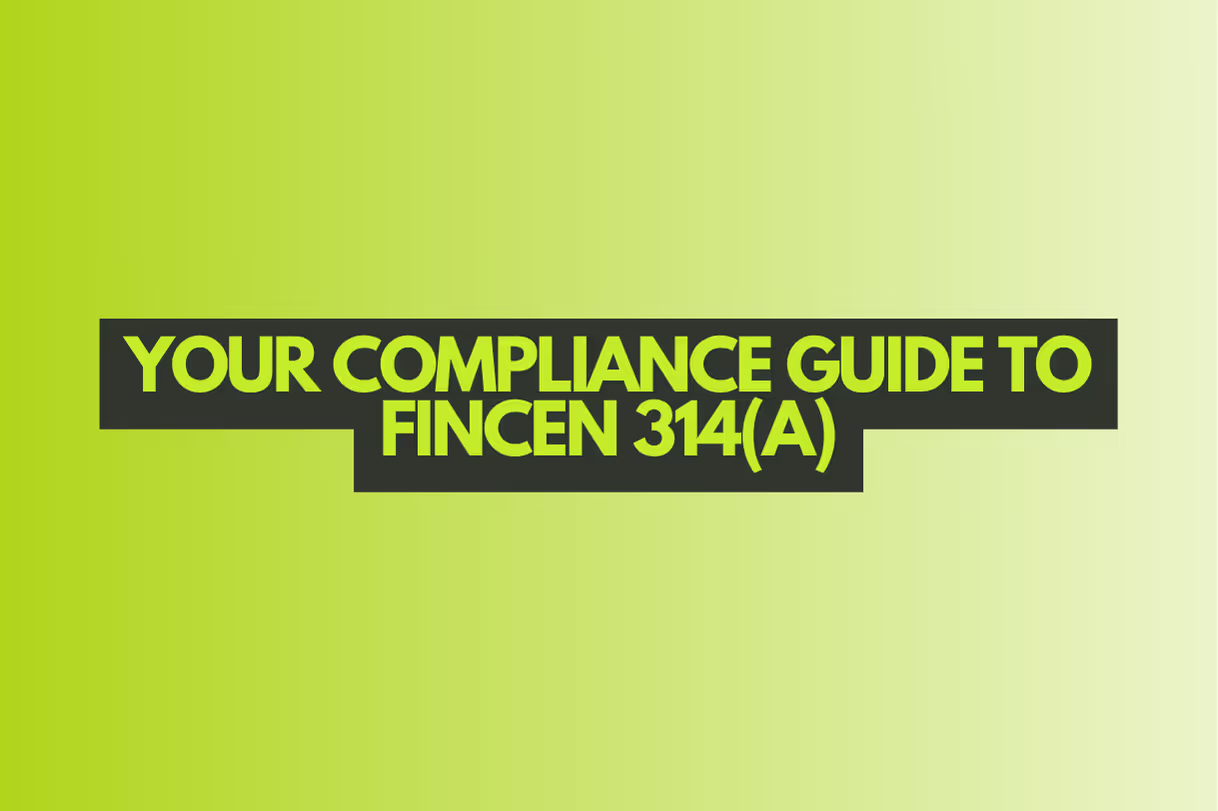
Your Compliance Guide to FinCEN 314(a)
FinCEN 314(a) screening is a targeted, event-driven compliance process that requires U.S. financial institutions to search their customer and transaction records for potential matches with individuals or entities suspected of involvement in money laundering or terrorist financing. Unlike ongoing sanctions screening, 314(a) screening is retrospective and confidential, with strict controls over data access and disclosure. Institutions must establish structured internal workflows, use appropriate technology to perform efficient and accurate searches, and ensure timely responses to FinCEN when matches are found. Key challenges include fragmented data, poor recordkeeping, and over-reliance on manual processes, all of which can be mitigated through automation, staff training, and strong governance. A robust 314(a) screening program not only ensures regulatory compliance but also supports broader national security objectives.
FinCEN 314(a) is a key information-sharing provision under the USA PATRIOT Act, enabling US law enforcement agencies to identify assets and transactions related to suspected money laundering and terrorist financing. Through this mechanism, the Financial Crimes Enforcement Network (FinCEN) distributes biweekly lists of individuals and entities under investigation to financial institutions. These institutions are required to conduct targeted searches across their customer and transactional databases to identify potential matches.
While the broader 314(a) framework encompasses cooperation and reporting, this article focuses specifically on screening obligations—the practical process by which financial institutions must search their records for connections to designated names. Effective screening under 314(a) requires clear procedures, robust technology, and careful governance to ensure institutions fulfill their obligations without compromising customer privacy or operational efficiency.
{{snippets-guide}}
The Scope of 314(a) Screening
FinCEN 314(a) screening is not a continuous name matching process like traditional sanctions screening. Instead, it is event-based: institutions receive a request, perform a search within specified parameters, and respond only if there is a match. The search is retrospective, typically covering 12 months of account information and 6 months of transactional data. The goal is to identify current or past relationships with individuals or entities listed by law enforcement.
Unlike sanctions lists, the names provided in 314(a) requests are confidential and may include both individuals and businesses suspected, but not yet charged, with criminal activity. Financial institutions must treat these lists with the utmost discretion, ensuring that only authorized personnel have access. Disclosure to the subject of a search is strictly prohibited and may itself constitute a legal violation.
Internal Screening Processes and Record-keeping
The effectiveness of 314(a) screening depends on well-defined internal processes. Upon receipt of a request, institutions must quickly coordinate among compliance, legal, and technology teams to search across relevant systems—including deposit accounts, securities, loans, wire transfers, and safe deposit boxes. Search protocols must be comprehensive yet narrowly tailored to meet the request requirements.
If a match is found, the institution must report it to FinCEN within 14 calendar days, including details of the relationship and relevant activity. If no match is found, no response is necessary. Regardless of the outcome, institutions should retain detailed records of the search process, including dates, systems queried, and the personnel involved. This documentation supports audit readiness and regulatory reviews.
Technology Considerations
Although 314(a) screening is different from real-time transaction monitoring or sanctions screening, technology still plays a vital role. Institutions should deploy automated tools that can ingest 314(a) request files and search across structured customer data fields with flexible matching logic. While fuzzy matching may be less appropriate given the precise legal nature of these requests, systems should accommodate aliases and alternative spellings.
Search tools should allow institutions to log queries, generate match reports, and create audit trails for internal and regulatory use. Integration with case management systems can streamline the review of potential matches. Importantly, access to 314(a) data must be restricted, and search logs must reflect access control, search results, and disposition of each case.
Confidentiality and Access Control
One of the defining characteristics of 314(a) screening is the strict confidentiality requirement. Financial institutions must implement policies and procedures that restrict access to 314(a) lists and related data. Staff involved in screening must be trained on confidentiality obligations and understand the legal risks associated with accidental or intentional disclosure.
Institutions should document who receives each request, who conducts the screening, and who reviews potential matches. A "need-to-know" approach should govern all access decisions. Additionally, internal systems should be configured to prevent printing, emailing, or exporting 314(a) lists outside of controlled environments.
Best Practices for Effective 314(a) Screening
To maintain compliance, institutions should develop a centralised 314(a) response team or designate a screening coordinator responsible for managing each request cycle. Establishing a repeatable workflow can reduce turnaround time and minimise the risk of human error. Regular testing of search processes and staff training ensures the program remains effective.
Proactive coordination with internal data owners—such as IT and operations—can improve the accuracy and completeness of search results. Institutions should also review their customer onboarding and data retention practices to ensure relevant data is accessible when needed. While 314(a) screening is retrospective, maintaining high-quality data is critical for reliable results.
Common Pitfalls and How to Avoid Them
One common issue in 314(a) screening is incomplete or fragmented data across systems, which can result in missed matches. Institutions should map where relevant data resides and ensure all applicable databases are included in each search. Another risk is treating 314(a) lists too similarly to sanctions lists, potentially triggering inappropriate escalation or unnecessary disruption.
A further pitfall is inadequate documentation or record-keeping. Institutions that cannot demonstrate when and how searches were performed may face challenges during audits. Implementing standard templates, access logs, and periodic compliance reviews can help mitigate this risk. Lastly, relying too heavily on manual processes increases the likelihood of errors—automation, where feasible, significantly improves reliability and speed.
{{snippets-case}}
You can learn more about choosing a screening service and avoiding the pitfalls in this article on our blog.
Final Thoughts: Building a 314(a)-Ready Compliance Culture
FinCEN 314(a) screening may be episodic, but it is a critical part of a financial institution's regulatory obligations. While the process is less continuous than traditional screening, it demands rigour, confidentiality, and accountability. Institutions that treat 314(a) as a box-ticking exercise may fall short in demonstrating effective compliance.
By investing in process clarity, internal training, and search capability, organizations can streamline their 314(a) response and reduce operational risk. In doing so, they not only meet regulatory expectations but also contribute meaningfully to national security objectives by helping identify criminal networks and disrupt illicit financial flows.
sanctions.io is a highly reliable and cost-effective solution for real-time screening. AI-powered and with an enterprise-grade API with 99.99% uptime are reasons why customers globally trust us with their compliance efforts and sanctions screening needs.
To learn more about how our sanctions, PEP, and criminal watchlist screening service can support your organization's compliance program: Book a free Discovery Call.
We also encourage you to take advantage of our free 7-day trial to get started with your sanctions and AML screening (no credit card is required).



